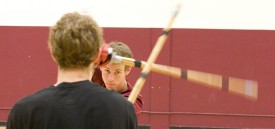Features Editor
Photos by Chris Clark
Brownson Arena is home to a variety of athletic activities: basketball, volleyball, wrestling.
And this year, for the first time ever, sword fighting.
“I never really fought before,” said Amanda Echolas, who was drawn to her first practice Thursday night by an interest in movies like “A Knight’s Tale” and shows like “Game of Thrones.”
“It was really fun, and I really enjoyed it,” she said. “I plan on coming back.”
The group was founded by CMU students Robert Cox, Austin Rickard and Cavell Carpendale. The trio had some experience in medieval combat but found that there was nowhere in the community to practice their unique interest. With the help of Scott Mathes, a local medieval combat enthusiast, they started the club this semester.
To be clear, the Medieval Alliance is not a live-action roleplaying group or foam-fighting guild. They are practicing a full-speed, full-contact, historically-inspired martial art.
“We strictly do not do magic,” Carpendale said, referencing live-action roleplayers who incorporate mock sorcery into their hobby.
“We strictly just do sword fighting,” Austin added. “We try to keep it historical.”
Cox, Mathes and Rickard suited up after practice to demonstrate sparring. Cox donned a thick leather breastplate and authentic medieval replica helmet while Mathes wore more contemporary sparring gear. Rickard wore a hockey helmet.
Actual medieval combat doesn’t resemble its portrayal in pop culture.
“Kills come pretty quickly,” Mathes said. “There’s no big, fancy duel.”
Most of the action comes before the swords even touch. The combatants dance around each other, testing for weaknesses, waiting for the perfect moment.
Then they strike, and it’s over in seconds. The swordsmen emerge from their armor sweaty and tired but none the worse for wear.
But there is no combat for the students. These padawans are not ready. Not yet.
Cox and Mathes started off the practice with light calisthenic warmups before moving on to footwork drills. The students crossed bamboo swords and faced off, performing an awkward shuffle, a parody of their instructors’ violent grace, as they react to each other’s steps.
“It’ll be full-speed, full-contact, and we’ll have strict regulations for equipment,” Cox said, describing the sparring tournament that the club plans once new members have completed the longsword proficiency course.
For now, though, the students practice poses and strikes and will soon move on to parrying drills.
Cox and Mathes are a wealth of knowledge about medieval combat. As Cox instructs the students on the Ox pose, (sword held up by shoulder, blade pointed straight out) he explains its historical significance.
“This is believed to be the first position your sword would go into if two swordsman met on the street and drew,” he said.
Cox also spoke about the importance of conditioning.
“The guys who used to do this every day went to battle with 60 to 80 pounds of armor on their back had incredible strength and stamina,” he said.
The instruction even branched into biomechanics and physics.
“You want to look at your partner’s clavicles,” Cox said. He explained that the structure of the human body will betray any movements an opposing swordsman makes through motion in the shoulder and chest area. “Do not look in your opponents eye unless you’re 100 percent sure you can psych them out.”
After practice, the instructors spoke to the students about the importance of chivalry.
Mathes, who grew up traveling the Renaissance circuit and has been practicing medieval combat for 23 years, clearly values the medieval European code of honor.
“We’re not here to hurt each other,” he said. “We’re here to teach each other, respect each other, learn from each other and grow.”
Cox also spoke about chivalry and the importance of practicing with care.
“We’re learning an art, a part of history that’s designed for war, but we don’t want to hurt each other,” he said.
crclark2@mavs.coloradomesa.edu


Recent Comments